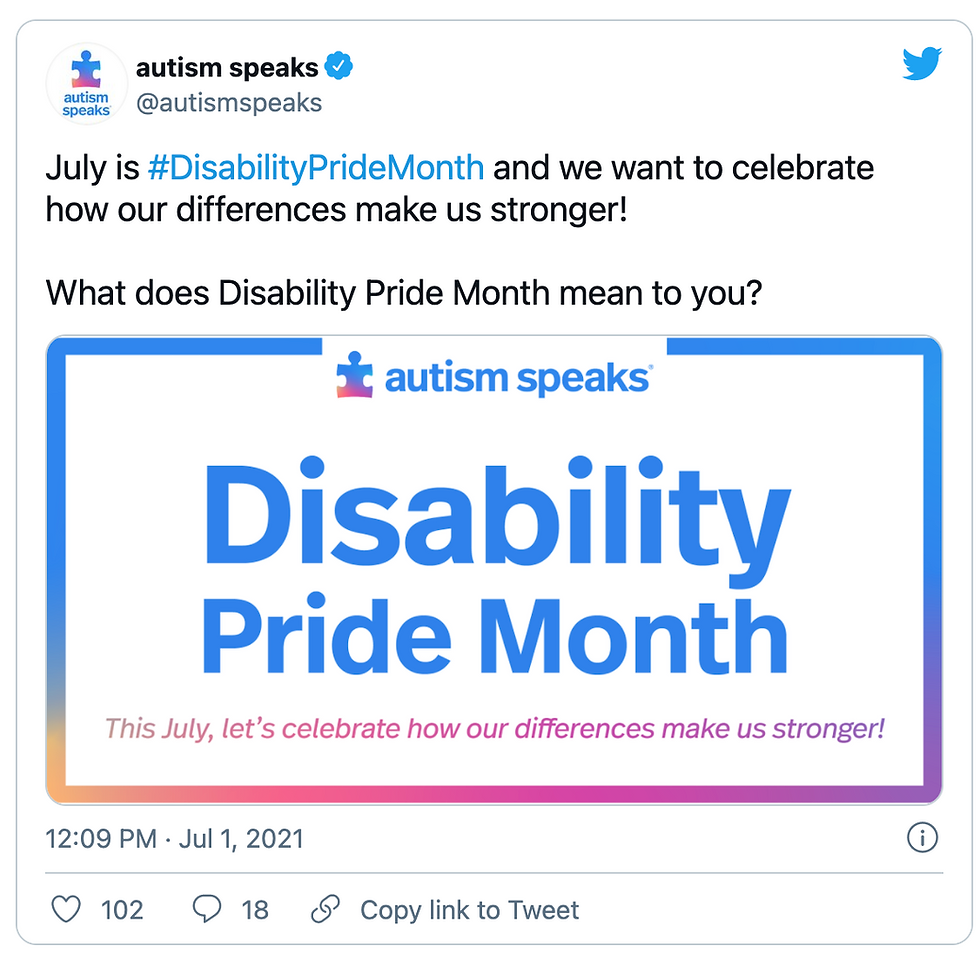Disability Pride Month: What is it? and Why it's Important?
- theundauntedfounda
- Jul 21, 2021
- 3 min read
July is Disability Pride Month, while not a national observance, it has gained more attention over the last few years. Today we're addressing what Disability Pride Month is and why it's important?

(Image from AmeriDisability www.ameridisability.com)
March is Developmental Disabilities Awareness Month, and as it is nationally observed some may believe another month dedicated to the disability community is not necessary. We hope after reading you will better understand the difference between the two months and understand why Disability Pride Month is so important.
The National Association of Councils on Developmental Disabilities (NACDD) has stated Developmental Disabilities Awareness Month “seeks to raise awareness about the inclusion of people with developmental disabilities in all facets of community life, as well as awareness of the barriers that people with disabilities still sometimes face in connecting to the communities in which they live.”
“Disability pride” has been defined by AmeriDisability (America’s Disability Community) as “accepting and honoring each person's uniqueness and seeing it as a natural and beautiful part of human diversity.”
AmeriDisability states “Disability Pride is an integral part of movement-building, and a direct challenge of systemic ableism and stigmatizing definitions of disability.”
Earlier this month Autism Speaks tweeted “July is #DisabilityPrideMonth” and we want to celebrate how our differences make us stronger!”

It’s easy to see the difference between acceptance of those with developmental and intellectual disabilities and truly honoring and celebrating disabilities as something that makes individuals unique and something they should be proud of.
AmeriDisability states: “Pride comes from celebrating our heritage, disability culture, the unique experiences that we have as people with differing abilities and the contributions that we offer society.”
The first Disability Pride was held in 1990 in Boston, MA, after The Americans with Disabilities Act (the civil-rights act prohibiting discrimination against people with disabilities) was signed by President George H.W. Bush on July 26, 1990.
The first Disability Pride parade was held in Chicago, IL in 2004, and while Disability Pride Month isn’t nationally recognized, there are currently Disability Pride parades, festivals, and events held in a growing number of cities nationwide.
While much has changed with regards to how we think about and treat those with disabilities (we no longer separate individuals from their families and society locking them away in facilities), there is still much work to do to change the negative attitudes and stigma of those with disabilities, to recognize that individuals are so much more than their disabilities, and to increase equity and justice for those within the disabled community.
"There is a tremendous need to create a counter-culture that teaches new values and beliefs, and acknowledges the dignity and worth of all human beings. Disability pride is a direct response to this need."
- Sarah Triano, National Disabled Students Union
According to the CDC, 61 million Americans live with a disability. This month, we hope you will take some time to learn more about what Disability Pride means, educate yourself about people with disabilities, and learn how you can honor and celebrate those in your circles and communities as well as take action to help support those with disabilities.
USA Today recently published a story "A chance to 'amplify one another': What is DisabilityPride Month?" spotlighting various individuals within the disability community and what Disability pride means to them. One of those was Jessica Ping-Wild, quoted below. To read additional perspectives, you can read the story here.
"To me, Disability Pride is many things. It's a chance for disabled people to declare their inherent self-worth, something that isn't often done by individuals outside of the community. It's a chance for the disabled community to come together, uplift, and amplify one another," Ping-Wild, founder of The Rolling Explorerblog, told USA TODAY. "Perhaps most importantly, it's a time for us all to make a whole lot of noise in the fight for disability justice."
To learn more about the myths and truths of people with disabilities, read “13 Myths & Facts Pertaining to People with Disabilities”.
In our research and reading this month we were touched by this article “Eunice Kennedy Shriver: A Voice for Developmental Disabilities”, written by a woman with an Intellectual & Developmental Disability. The author shares Shriver’s efforts and activism that changed the perception of those with disabilities as well as changed the way those with disabilities were treated and included in society, and the opportunities available, like the Special Olympics.
Lastly, we wanted to share a recent article discussing how the For the People Act’s paper ballot mandate will negatively impact voters with disabilities. You can read it here.



Comments